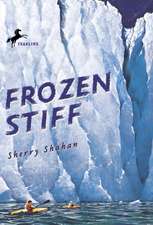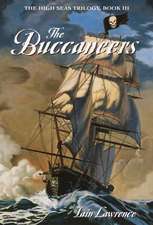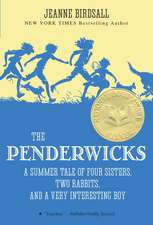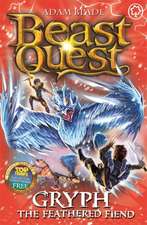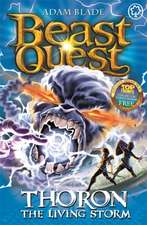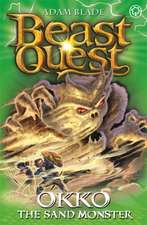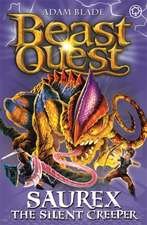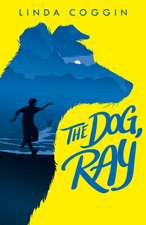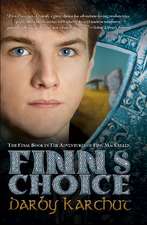Fish
Autor L.S. MATTHEWSen Limba Engleză Paperback – 31 mai 2006 – vârsta de la 8 până la 12 ani
Right before we were leaving I saw a fish in a small brown puddle and I knew I had to take it with me. The journey would be hard to get across the mountains—to the safety of the border and the people there who could help us. Yet when I put the fish in the pot I never realized what we would have to face. It never occurred to me to leave Fish behind.
A subtle and sophisticated exploration of life, the strength of humanity, and survival in an unforgiving world, Fish is a story that will teach those who doubt that, when hope is almost extinguished, miracles can happen.
From the Hardcover edition.
Preț: 41.38 lei
Nou
Puncte Express: 62
Preț estimativ în valută:
7.92€ • 8.63$ • 6.67£
7.92€ • 8.63$ • 6.67£
Carte disponibilă
Livrare economică 03-17 aprilie
Preluare comenzi: 021 569.72.76
Specificații
ISBN-13: 9780440420217
ISBN-10: 0440420210
Pagini: 183
Dimensiuni: 132 x 193 x 13 mm
Greutate: 0.18 kg
Editura: Yearling Books
ISBN-10: 0440420210
Pagini: 183
Dimensiuni: 132 x 193 x 13 mm
Greutate: 0.18 kg
Editura: Yearling Books
Notă biografică
L. S. Matthews is a first-time author, and the winner of the Fidler Award for her book Fish, an award given for a first novel for children. She lives and writes in England.
From the Hardcover edition.
From the Hardcover edition.
Extras
ONE
This story starts with the day I found the fish.
I was standing about with nothing to do, by the huge puddle I called a pond. Dad said it wasn't a proper pond, because the floody rain had left it there by accident, and it would disappear again soon.
I said, "What is it then? Because it's too big to be a puddle."
Dad had to agree I was right. He is quite tall, and it was as wide each way as three Dads if you laid them out head to toe, in a line.
At least, it had been that big. It had been shrinking every day since the rain had stopped, and now I realized that it had become the puddle that Dad had always said it was.
Anyway, I was standing about, as I said, with a stick in my hand poking at things, because there was nothing else to do. I couldn't swish the stick in the water because I couldn't get close enough to the edge. The mud was terrible. I had already fallen over in it three times and my clothes were covered in it. I wasn't worried about what my parents would say because they never minded, they were so busy anyway. Now that the rain had stopped, we could dry things again.
So I stood in the last patch of sticky mud before it turned into the liquid patch, and hit at some bits of green poking out of the water's edge.
All of a sudden there was a ripple and a flash, and a big fish leapt out of the brown water, making a rainbow in the spray as it flew in an arc and landed back--splash!--in the water again.
I had been feeling very gloomy a moment before. Now I stood and blinked and stared. Nothing moved. I wanted to see the fish again. The glow of the colors had flooded my eyes, like when you open the curtains on a lovely sunny day. I had a warm feeling all through, despite the mud.
I put one foot forward and tested the ground a bit further in. I had old leather sandals on and bare feet, but you wouldn't have known it. The mud had made big, oozy mud clogs around each foot.
I wanted the ground to be safe to walk on, because I so wanted to find that fish. But it wasn't safe--I knew I'd get stuck if I got any closer, and I was quite a way from the house, and maybe no one would hear me call and no one would come looking till teatime. I walked all around the edge, just in case, but it was the same everywhere.
Very slowly, because it is hard to walk in oozy mud clogs, I walked back up the rough earth path to the house.
Dad was there, because it was his turn to look after me and do the tea. He looked tired and dusty. We hadn't got much water for things like washing, in spite of all the rain.
We were a funny family--not like the ones in the books I read, which we'd brought from our own country.
That was one thing that was different about us for a start--we didn't come from the country we were living in now. Mum and Dad had brought me with them when I was little. They had come to this country to help the people, who were having a hard time.
And they were having a hard time, I can tell you.
First, it was boiling hot, but not like the summers in our home country. This hot was dusty hot, with no green growing anywhere. There had been bits of bushes and wispy dry grass in the beginning, I can remember, but after a while even that had gone. I had stroked the goats and the donkey who'd come to nibble at it. Then they stopped coming and I missed them and asked why they didn't visit anymore.
Mum had said, "Because there's no more grass and leaves." She had pushed her hands through her hair when she said this, and had looked so tired and sad, I was surprised. I didn't know she'd liked the animals visiting too.
The boiling hot had stayed for what seemed like forever. The people Mum and Dad taught, and sometimes helped with medicine, ran out of water and food. We were luckier, because our country was still looking after us with some food (not very nice food) and bottled water. I asked, Couldn't we give our food and water to the people?
Mum and Dad said that our country could only give enough for us really, but they were sharing as much as they could. All the people in the whole country needed food and water, and medicine, and there were thousands of them. Our little bit couldn't look after all of them.
All the same, I sneaked bits to share with my friends in the village. Most of these didn't have parents anymore because they'd been killed in the fighting in other villages. They'd come to our village because it was safe here. Some had an uncle or aunt to stay with. Lots of the women had lost their husbands and some of those women became the children's pretend mums. It probably sounds bad to you, and now I'm older, I understand better, but the fact is that all that seemed normal to me at the time and I didn't think much about it, because that was how I grew up.
Most of the kids played and teased like any kids. Some always stood in doorways with big scared eyes and never spoke. The kids who were playing might ask them to come and join in once, but when they didn't would then ignore them as boring. It was annoying when we needed an extra for some game or other. I asked Mum what was the matter with them, and she said that they'd had a terrible thing happen, or had seen something terrible. It was like a nightmare, and you know when you first wake up from it you can't just go back to sleep? They were stuck in that feeling.
So I tried a bit longer and a bit harder than my friends and one or two of those ones came round and started to play, with time, if we kept on at them. The ones who didn't I called "lost," and I felt a funny feeling like a big black stone in my chest when I looked at them, staring at nothing as we played, or rocking on the floor and growing thinner every day.
More and more of those, and some grown-ups, too, were turning up every day.
We had a ritual every morning, taking the corners of a blanket with a friend on it who couldn't walk at all, maybe with no legs. We'd pull them out to join in with whatever we were up to that day, or take them where they wanted to go. One or two of them were quite bossy, but they were brilliant at thinking up games.
One day, the rain came. At first it was exciting, and I thought everything would be better now. But although Mum and Dad laughed at me dancing in it, and came out and danced with me when I dragged them out by the hands, they still looked worried underneath, if you know what I mean.
The rain was very heavy, so heavy it hit you hard on your head and shoulders, like someone dropping a big bucket of water on you, but over and over again without stopping. You couldn't think or hear or see. Me and my friends grabbed the blankets of the ones who didn't walk and raced them back into their houses again. I sat inside and waited for it to stop. And waited.
That night, as I lay in my little bed on the floor, I heard the drumming and thrumming of the rain on the roof stop, and thought, At last. Now I can go to sleep. And maybe I can go outside and play in the morning.
But then there was a sound of people talking at the door. I could hear Dad getting ready to go out. I got out of bed and asked Mum what was happening.
She said, "The rain has come down so fast and heavily on the dry hard ground that it hasn't soaked in. It's run off and made rivers and has flooded people's homes. Dad's going to try and help rescue some of them."
In the morning Dad was on the big bed, fast asleep on top of some towels, with all his clothes still on and wet through. We let him sleep just a little bit longer, because he looked so tired, but then we had to wake him up and make him get changed and dry properly.
He sat up in bed with a hot drink and explained, "You know that big crack that runs across the top of the hill above the village where we were walking the other day, and I told you not to go near it?"
I nodded.
"Well, the rain had poured into it and just cut off the side of the hill--all the hill on the outside of the crack just fell away. And the rain made some of the earth into mud, and some of it was in big lumps and rocks. The whole lot fell down and covered the houses on the edge of the village. It's called a landslide when that happens. We did get some people out. . . ." And then he stopped and just looked into his cup, and Mum said it was time for him to try and sleep again.
That rain was the rain that had left the pond. The water was drying up everywhere, and the few hungry animals left quickly ate any tiny green shoot that appeared. Instead of a dusty brown country, we were in a muddy brown country. And it started to get colder. This country was very cold at night, and cold all the time in the winter. The dead bushes were soon all gathered for burning. Trees on the hills had been cut down for firewood long ago. Dad said, if that hadn't happened, the trees' roots would have helped stop the land moving when the rains came.
We'd been short of water before because there had been no rain for so long. Now everyone was short of water, though it lay in big pools and filled ditches all around us, because it was bad, poisonous water. People who drank it became ill and some died. It wouldn't be so bad if you boiled it, Mum said, but where were the people to get firewood to make the fires to boil it?
I was telling you how bad it was for the people here. And if the weather wasn't bad enough, there was some kind of war going on, though I never heard or saw it.
"Everyone is so sick and hungry and weak. How could they fight?" I asked Dad. He just said, "If there is any food, or any water, the soldiers will always get it first. They are not as sick and weak as the people we see here every day."
So now you understand why I was gloomy, just before I saw the fish. We'd had only some kind of boiled porridge to eat for days now. The fact that there wasn't very much of it was the only good thing about it, as far as I could see, although I was hungry all the time. We followed every meal of this with a vitamin C tablet for dessert. This was the closest thing I had to a sweet, and I made it last as long as possible by sucking it very slowly.
Then my playmates from the village just disappeared one day. All the families and orphans and widows were leaving. Mum and Dad were busy in the day as never before, but more worried and serious in the evenings. They sat up late talking, talking.
"Why is everyone going? Where are they going?" I asked.
"They have heard that the war is coming here. And there is no food left here anyway. They are trying to cross the border into the next country."
"Then they will be all right?" I asked. "Why don't we do that?"
"The next country is being kind and letting them in, but they need to find somewhere proper to live. They've made a refugee camp, but it's just tents and huts. There is still not enough food, water and medicine for everyone, although the charities are sending it as fast as they can. Our people back at home have been telling us to leave for some time. We could go back there. But we wanted to stay and help for as long as there were people here that needed help," Mum explained. She looked worried, as always, but now as she looked across at Dad, there was something else in her eyes.
"Why are you looking like I do when I'm fibbing?" I said suspiciously.
Mum looked surprised and then she laughed and took my face in her hands.
"Oh, I'm telling you the truth. It's just, it's all right for me and Dad to risk staying on. And we want to do the right thing by all our neighbors here. They can't just pack it in and go home--this is their home. But we have to think about you, too. And staying here is not good for you. It's difficult. We hoped things would get better. We thought we could stick it out. But now it's not if we leave, it's when."
I didn't really follow all this, but I think it dawned on me later, when I was trudging back up the path to tell Dad about the fish, that Mum had said "when we leave," and that meant, the world was not going to be like this forever and ever, and things would be better soon--at least, for us.
When I got to the house door, Dad was stuffing things into bags. A big pot of porridge--lots of it, I noticed glumly--was boiling on the side.
"Oh, there you are! Exciting news," he said, trying to put on a pleased face over his worried one. "We're setting off back home. We've had absolutely last orders to get out. The war is coming here and anyway, the last people have left--there's no one here for us to help anymore. Don't worry, we'll have plenty of time before the soldiers start moving."
I wondered why he was hurrying with his packing so much, if there wasn't any danger, but I didn't say anything, just stood there with the mud on me sliding slightly toward the ground. He looked up from pushing a battered saucepan into a duffel bag and took another look at me.
"Oh, for Heaven's sake, look at you. Still, you may as well use up all the water now for washing. I've packed what we'll need. There's no time to dry those clothes, that's all. Look, just leave them here. You just need clean ones on and some warm ones in your bag for the nights."
From the Hardcover edition.
This story starts with the day I found the fish.
I was standing about with nothing to do, by the huge puddle I called a pond. Dad said it wasn't a proper pond, because the floody rain had left it there by accident, and it would disappear again soon.
I said, "What is it then? Because it's too big to be a puddle."
Dad had to agree I was right. He is quite tall, and it was as wide each way as three Dads if you laid them out head to toe, in a line.
At least, it had been that big. It had been shrinking every day since the rain had stopped, and now I realized that it had become the puddle that Dad had always said it was.
Anyway, I was standing about, as I said, with a stick in my hand poking at things, because there was nothing else to do. I couldn't swish the stick in the water because I couldn't get close enough to the edge. The mud was terrible. I had already fallen over in it three times and my clothes were covered in it. I wasn't worried about what my parents would say because they never minded, they were so busy anyway. Now that the rain had stopped, we could dry things again.
So I stood in the last patch of sticky mud before it turned into the liquid patch, and hit at some bits of green poking out of the water's edge.
All of a sudden there was a ripple and a flash, and a big fish leapt out of the brown water, making a rainbow in the spray as it flew in an arc and landed back--splash!--in the water again.
I had been feeling very gloomy a moment before. Now I stood and blinked and stared. Nothing moved. I wanted to see the fish again. The glow of the colors had flooded my eyes, like when you open the curtains on a lovely sunny day. I had a warm feeling all through, despite the mud.
I put one foot forward and tested the ground a bit further in. I had old leather sandals on and bare feet, but you wouldn't have known it. The mud had made big, oozy mud clogs around each foot.
I wanted the ground to be safe to walk on, because I so wanted to find that fish. But it wasn't safe--I knew I'd get stuck if I got any closer, and I was quite a way from the house, and maybe no one would hear me call and no one would come looking till teatime. I walked all around the edge, just in case, but it was the same everywhere.
Very slowly, because it is hard to walk in oozy mud clogs, I walked back up the rough earth path to the house.
Dad was there, because it was his turn to look after me and do the tea. He looked tired and dusty. We hadn't got much water for things like washing, in spite of all the rain.
We were a funny family--not like the ones in the books I read, which we'd brought from our own country.
That was one thing that was different about us for a start--we didn't come from the country we were living in now. Mum and Dad had brought me with them when I was little. They had come to this country to help the people, who were having a hard time.
And they were having a hard time, I can tell you.
First, it was boiling hot, but not like the summers in our home country. This hot was dusty hot, with no green growing anywhere. There had been bits of bushes and wispy dry grass in the beginning, I can remember, but after a while even that had gone. I had stroked the goats and the donkey who'd come to nibble at it. Then they stopped coming and I missed them and asked why they didn't visit anymore.
Mum had said, "Because there's no more grass and leaves." She had pushed her hands through her hair when she said this, and had looked so tired and sad, I was surprised. I didn't know she'd liked the animals visiting too.
The boiling hot had stayed for what seemed like forever. The people Mum and Dad taught, and sometimes helped with medicine, ran out of water and food. We were luckier, because our country was still looking after us with some food (not very nice food) and bottled water. I asked, Couldn't we give our food and water to the people?
Mum and Dad said that our country could only give enough for us really, but they were sharing as much as they could. All the people in the whole country needed food and water, and medicine, and there were thousands of them. Our little bit couldn't look after all of them.
All the same, I sneaked bits to share with my friends in the village. Most of these didn't have parents anymore because they'd been killed in the fighting in other villages. They'd come to our village because it was safe here. Some had an uncle or aunt to stay with. Lots of the women had lost their husbands and some of those women became the children's pretend mums. It probably sounds bad to you, and now I'm older, I understand better, but the fact is that all that seemed normal to me at the time and I didn't think much about it, because that was how I grew up.
Most of the kids played and teased like any kids. Some always stood in doorways with big scared eyes and never spoke. The kids who were playing might ask them to come and join in once, but when they didn't would then ignore them as boring. It was annoying when we needed an extra for some game or other. I asked Mum what was the matter with them, and she said that they'd had a terrible thing happen, or had seen something terrible. It was like a nightmare, and you know when you first wake up from it you can't just go back to sleep? They were stuck in that feeling.
So I tried a bit longer and a bit harder than my friends and one or two of those ones came round and started to play, with time, if we kept on at them. The ones who didn't I called "lost," and I felt a funny feeling like a big black stone in my chest when I looked at them, staring at nothing as we played, or rocking on the floor and growing thinner every day.
More and more of those, and some grown-ups, too, were turning up every day.
We had a ritual every morning, taking the corners of a blanket with a friend on it who couldn't walk at all, maybe with no legs. We'd pull them out to join in with whatever we were up to that day, or take them where they wanted to go. One or two of them were quite bossy, but they were brilliant at thinking up games.
One day, the rain came. At first it was exciting, and I thought everything would be better now. But although Mum and Dad laughed at me dancing in it, and came out and danced with me when I dragged them out by the hands, they still looked worried underneath, if you know what I mean.
The rain was very heavy, so heavy it hit you hard on your head and shoulders, like someone dropping a big bucket of water on you, but over and over again without stopping. You couldn't think or hear or see. Me and my friends grabbed the blankets of the ones who didn't walk and raced them back into their houses again. I sat inside and waited for it to stop. And waited.
That night, as I lay in my little bed on the floor, I heard the drumming and thrumming of the rain on the roof stop, and thought, At last. Now I can go to sleep. And maybe I can go outside and play in the morning.
But then there was a sound of people talking at the door. I could hear Dad getting ready to go out. I got out of bed and asked Mum what was happening.
She said, "The rain has come down so fast and heavily on the dry hard ground that it hasn't soaked in. It's run off and made rivers and has flooded people's homes. Dad's going to try and help rescue some of them."
In the morning Dad was on the big bed, fast asleep on top of some towels, with all his clothes still on and wet through. We let him sleep just a little bit longer, because he looked so tired, but then we had to wake him up and make him get changed and dry properly.
He sat up in bed with a hot drink and explained, "You know that big crack that runs across the top of the hill above the village where we were walking the other day, and I told you not to go near it?"
I nodded.
"Well, the rain had poured into it and just cut off the side of the hill--all the hill on the outside of the crack just fell away. And the rain made some of the earth into mud, and some of it was in big lumps and rocks. The whole lot fell down and covered the houses on the edge of the village. It's called a landslide when that happens. We did get some people out. . . ." And then he stopped and just looked into his cup, and Mum said it was time for him to try and sleep again.
That rain was the rain that had left the pond. The water was drying up everywhere, and the few hungry animals left quickly ate any tiny green shoot that appeared. Instead of a dusty brown country, we were in a muddy brown country. And it started to get colder. This country was very cold at night, and cold all the time in the winter. The dead bushes were soon all gathered for burning. Trees on the hills had been cut down for firewood long ago. Dad said, if that hadn't happened, the trees' roots would have helped stop the land moving when the rains came.
We'd been short of water before because there had been no rain for so long. Now everyone was short of water, though it lay in big pools and filled ditches all around us, because it was bad, poisonous water. People who drank it became ill and some died. It wouldn't be so bad if you boiled it, Mum said, but where were the people to get firewood to make the fires to boil it?
I was telling you how bad it was for the people here. And if the weather wasn't bad enough, there was some kind of war going on, though I never heard or saw it.
"Everyone is so sick and hungry and weak. How could they fight?" I asked Dad. He just said, "If there is any food, or any water, the soldiers will always get it first. They are not as sick and weak as the people we see here every day."
So now you understand why I was gloomy, just before I saw the fish. We'd had only some kind of boiled porridge to eat for days now. The fact that there wasn't very much of it was the only good thing about it, as far as I could see, although I was hungry all the time. We followed every meal of this with a vitamin C tablet for dessert. This was the closest thing I had to a sweet, and I made it last as long as possible by sucking it very slowly.
Then my playmates from the village just disappeared one day. All the families and orphans and widows were leaving. Mum and Dad were busy in the day as never before, but more worried and serious in the evenings. They sat up late talking, talking.
"Why is everyone going? Where are they going?" I asked.
"They have heard that the war is coming here. And there is no food left here anyway. They are trying to cross the border into the next country."
"Then they will be all right?" I asked. "Why don't we do that?"
"The next country is being kind and letting them in, but they need to find somewhere proper to live. They've made a refugee camp, but it's just tents and huts. There is still not enough food, water and medicine for everyone, although the charities are sending it as fast as they can. Our people back at home have been telling us to leave for some time. We could go back there. But we wanted to stay and help for as long as there were people here that needed help," Mum explained. She looked worried, as always, but now as she looked across at Dad, there was something else in her eyes.
"Why are you looking like I do when I'm fibbing?" I said suspiciously.
Mum looked surprised and then she laughed and took my face in her hands.
"Oh, I'm telling you the truth. It's just, it's all right for me and Dad to risk staying on. And we want to do the right thing by all our neighbors here. They can't just pack it in and go home--this is their home. But we have to think about you, too. And staying here is not good for you. It's difficult. We hoped things would get better. We thought we could stick it out. But now it's not if we leave, it's when."
I didn't really follow all this, but I think it dawned on me later, when I was trudging back up the path to tell Dad about the fish, that Mum had said "when we leave," and that meant, the world was not going to be like this forever and ever, and things would be better soon--at least, for us.
When I got to the house door, Dad was stuffing things into bags. A big pot of porridge--lots of it, I noticed glumly--was boiling on the side.
"Oh, there you are! Exciting news," he said, trying to put on a pleased face over his worried one. "We're setting off back home. We've had absolutely last orders to get out. The war is coming here and anyway, the last people have left--there's no one here for us to help anymore. Don't worry, we'll have plenty of time before the soldiers start moving."
I wondered why he was hurrying with his packing so much, if there wasn't any danger, but I didn't say anything, just stood there with the mud on me sliding slightly toward the ground. He looked up from pushing a battered saucepan into a duffel bag and took another look at me.
"Oh, for Heaven's sake, look at you. Still, you may as well use up all the water now for washing. I've packed what we'll need. There's no time to dry those clothes, that's all. Look, just leave them here. You just need clean ones on and some warm ones in your bag for the nights."
From the Hardcover edition.
Descriere
A subtle and sophisticated exploration of life, the strength of humanity, and survival in an unforgiving world, "Fish" is a story that will teach those who doubt that, when hope is almost extinguished, miracles can happen.


